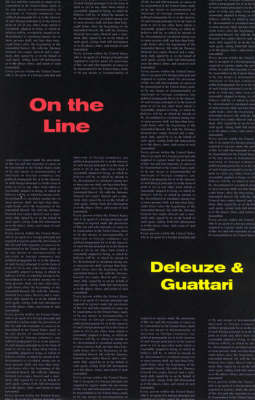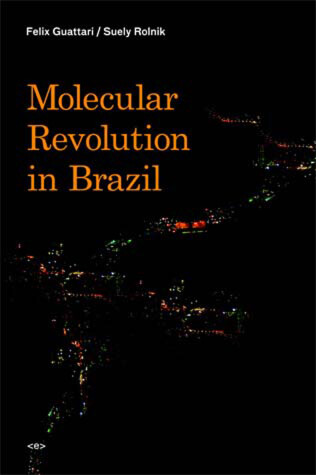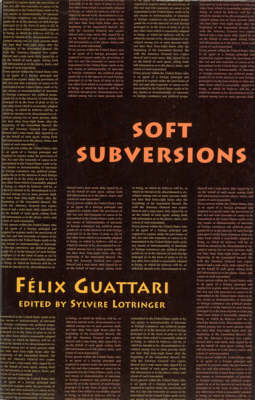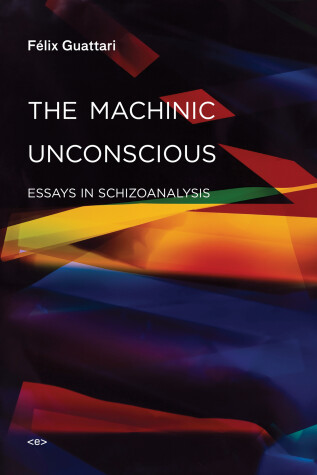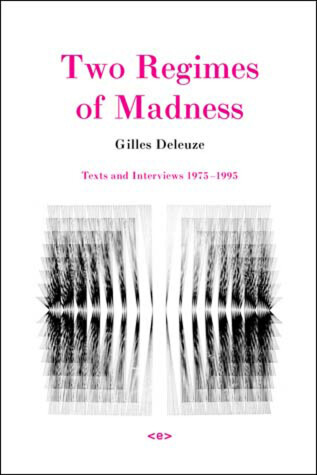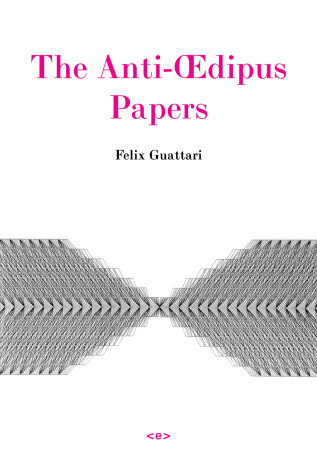Semiotext(e) / Foreign Agents
11 total works
The first presentation of Gilles Deleuze and Felix Guattari's concept of the "rhizome."
A rhizome may be broken, shattered at a given spot, but it will start up again on one of its old lines, or on new lines. You can never get rid of ants because they form an animal rhizome that can rebound time and again after most of it has been destroyed... There is a rupture in the rhizome whenever segmentary lines explode into a line of flight, but the line of flight is part of the rhizome. That is why one can never posit a dualism or a dichotomy, even in the rudimentary form of the good and the bad. You may make a rupture, draw a line of flight, yet there still is a danger that you will stratify again everything, from Oedipal resurgences to fascist concretions. Groups and individuals contain microfascisms just waiting to crystallize. Yes, couch grass is also a rhizome.
Edited by Sylvere Lotringer, On the Line was the first book published in the new "Foreign Agents" series in 1983. It gathers together two seminal texts that Deleuze and Guattari would later elaborate on in A Thousand Plateaus. First delivered in French by Deleuze (drawing graphs on the blackboard) at the "Schizo-Culture" conference organized by Semiotext(e) at Columbia University in 1975, "Rhizome" introduced a new kind of thinking in philosophy, both non-dialectical and non-hierarchical. The two didn't expect this neo-anarchical blue-print would eventually offer an early template for the understanding of the internet. "Rhizome" substitutes pragmatic, "couch grass," free-floating logic to the binary, oppositional, and exclusive model of the tree. In "Politics," superceding the Marxist concept of class, Deleuze envisages the social macrocosm as a series of lines, and reinvent politics as a process of flux whose outcome will always be unpredictable. It is, he emphasizes, the end of the idea of revolution, but not of the "becoming revolutionary." Throughout, he keeps dispelling the notion of capitalism as a repressive machine only meant to extract surplus value from exploited workers and suggest that it could be opposed from within by redirecting the creativity and multiplicity of its flows.The multiple must be made, not always by adding another dimension, rather in the simplest way, by dint of sobriety... A rhizome as subterranean stem is absolutely different from roots and radices. Bulbs and tubers are rhizomes... Even some animals are, in their pack forms. Rats are rhizomes. Burrows are too, in all their function of shelter, supply, movement, evasion and breakout... The rhizome includes the best and the worst: potato and couch grass.
Chaosophy is an introduction to Félix Guattari's groundbreaking theories of “schizo-analysis”: a process meant to replace Freudian interpretation with a more pragmatic, experimental, and collective approach rooted in reality. Unlike Freud, who utilized neuroses as his working model, Guattari adopted the model of schizophrenia—which he believed to be an extreme mental state induced by the capitalist system itself, and one that enforces neurosis as a way of maintaining normality. Guattari's post-Marxist vision of capitalism provides a new definition not only of mental illness, but also of the micropolitical means for its subversion. Chaosophy includes such provocative pieces as “Everybody Wants to Be a Fascist,” a group of texts on Guattari's collaborative work with Gilles Deleuze (including the appendix to Anti-Oedipus, not available in the English edition), and “How Martians Make Love,” a roundtable discussion with Guattari, Lotringer, Catherine Clément, and Serge Leclaire from 1972 (still unpublished in French). This new, expanded edition features a new introduction by François Dosse (author of a new biography of Guattari and Gilles Deleuze) and a range of additional essays, including “Franco Basaglia: Guerrilla Psychiatrist,” ”The Transference,” “Semiological Subjection, Semiotic Enslavement,” “The Place of the Signifier in the Institution,” and “Three Billion Perverts on the Stand.”
A fascinating anthology of texts and interviews written over 20 years by renowned French philosopher Gilles Deleuze.
"One day, perhaps, this century will be Deleuzian," Michel Foucault once wrote. This book anthologizes 40 texts and interviews written over 20 years by renowned French philosopher Gilles Deleuze, who died in 1995. The early texts, from 1953-1966 (on Rousseau, Kafka, Jarry, etc.), belong to literary criticism and announce Deleuze's last book, Critique and Clinic (1993). But philosophy clearly predominates in the rest of the book, with sharp appraisals of the thinkers he always felt indebted to: Spinoza, Bergson. More surprising is his acknowledgement of Jean-Paul Sartre as his master. "The new themes, a certain new style, a new aggressive and polemical way of raising questions," he wrote, "come from Sartre." But the figure of Nietzsche remains by far the most seminal, and the presence throughout of his friends and close collaborators, Felix Guattari and Michel Foucault. The book stops shortly after the publication of Anti-Oedipus, and presents a kind of genealogy of Deleuze's thought as well as his attempt to leave philosophy and connect it to the outside-but, he cautions, as a philosopher.
The post-'68 psychoanalyst and philosopher visits a newly democratic Brazil in 1982 and meets future President Luis Ignacia Lula da Silva: a guide to the radical thought and optimism at the root of today's Brazil.
Yes, I believe that there is a multiple people, a people of mutants, a people of potentialities that appears and disappears, that is embodied in social, literary, and musical events.... I think that we're in a period of productivity, proliferation, creation, utterly fabulous revolutions from the viewpoint of this emergence of a people. That's molecular revolution: it isn't a slogan or a program, it's something that I feel, that I live....-from Molecular Revolution in Brazil
Following Brazil's first democratic election after two decades of military dictatorship, French philosopher Felix Guattari traveled through Brazil in 1982 with Brazilian psychoanalyst Suely Rolnik and discovered an exciting, new political vitality. In the infancy of its new republic, Brazil was moving against traditional hierarchies of control and totalitarian regimes and founding a revolution of ideas and politics. Molecular Revolution in Brazil documents the conversations, discussions, and debates that arose during the trip, including a dialogue between Guattari and Brazil's future President Luis Ignacia Lula da Silva, then a young gubernatorial candidate. Through these exchanges, Guattari cuts through to the shadowy practices of globalization gone awry and boldly charts a revolution in practice.
Assembled and edited by Rolnik, Molecular Revolution in Brazil is organized thematically; aphoristic at times, it presents a lesser-known, more overtly political aspect of Guattari's work. Originally published in Brazil in 1986 as Micropolitica: Cartografias do desejo, the book became a crucial reference for political movements in Brazil in the 1980s and 1990s. It now provides English-speaking readers with an invaluable picture of the radical thought and optimism that lies at the root of Lula's Brazil.
This new edition of Soft Subversions expands, reorganizes, and develops the original 1996 publication, offering a carefully organized arrangement of essays, interviews, and short texts that present a fuller scope to Guattari's thinking from 1977 to 1985. This period encompasses what Guattari himself called the “Winter Years” of the early 1980s—the ascent of the Right, the spread of environmental catastrophe, the rise of a disillusioned youth with diminished prospects for career and future, and the establishment of a postmodernist ideology that offered solutions toward adaptation rather than change—a period with discernible echoes twenty years later. Following Semiotext(e)'s release last season of the new, expanded edition of Chaosophy: Texts and Interviews 1972–1977, this book makes Guattari's central ideas and concepts fully available in the format that had been best suited to Guattari's temperament: the guerrilla-styled intervention of the short essay and interactive dialogue. This edition includes such previously unpublished, substantive texts as “Institutional Intervention” and “About Schools,” along with new translations of “War, Crisis, or Life” and “The Nuclear State,” interviews and essays on a range of topics including adolescence and Italy, dream analysis and schizo-analysis, Marcel Proust and Jimmy Carter, as well as invaluable autobiographical documents such as “I Am an Idea-Thief” and “So What.”
In this daring essay inspired by Nietzsche, Gilles Deleuze and Felix Guattari redefine the relation between the state and its war machine. Far from being a part of the state, warriers (the army) are nomads who always come from the outside and keep threatening the authority of the state. In the same vein, nomadic science keeps infiltrating royal science, undermining its axioms and principles. Nomadology is a speedy, pocket-sized treatise that refuses to be pinned down. Theorizing a dynamic relationship between sedentary power and "schizophrenic lines of flight," this volume is meant to be read in transit, smuggled into urban nightclubs, offices, and subways. Deleuze and Guattari propose a creative and resistant ethics of becoming-imperceptible, strategizing a continuous invention of weapons on the run. An anarchic bricolage of ideas uprooted from anthropology, aesthetics, history, and military strategy, Nomadology carries out Deleuze's desire to "leave philosophy, but to leave it as a philosopher."
We certainly have the unconscious that we deserve, an unconscious for specialists, ready-made for an institutionalized discourse. I would rather see it as something that wraps itself around us in everyday objects, something that is involved with day-to-day problems, with the world outside. It would be the possible itself, open to the socius, to the cosmos...—from The Machinic Unconscious: Essays in Schizoanalysis
In his seminal solo-authored work The Machinic Unconscious (originally published in French in 1979), Félix Guattari lays the groundwork for a general pragmatics capable of resisting the semiotic enslavement of subjectivity. Concluding that psychoanalytic theory had become part and parcel of a repressive, capitalist social order, Guattari here outlines a schizoanalytic theory to undo its capitalist structure and set the discipline back on its feet. Combining theoretical research from fields as diverse as cybernetics, semiotics, ethnology, and ethology, Guattari reintroduces into psychoanalysis a “polemical” dimension, at once transhuman, transsexual, and transcosmic, that brings out the social and political—the “machinic”—potential of the unconscious. To illustrate his theory, Guattari turns to literature and analyzes the various modes of subjectivization and semiotization at work in Proust's In Search of Lost Time, examining the novel as if he were undertaking a scientific exploration in the style of Freud or Newton. Casting Proust's figures as abstract (“hyper-deterritorialized”) mental objects, Guattari maps the separation between literature and science, elaborating along the way such major Deleuze-Guattarian concepts as “faciality” and “refrain,” which would be unpacked in their subsequent A Thousand Plateaus: Capitalism and Schizophrenia. Never before available in English, The Machinic Unconscious has for too long been the missing chapter from Deleuze and Guattari's Anti-Oedipus project: the most important political extension of May 1968 and one of the most important philosophical contributions of the twentieth century.
People tend to confuse winning freedom with conversion to capitalism. It is doubtful that the joys of capitalism are enough to free peoples.... The American “revolution” failed long ago, long before the Soviet one. Revolutionary situations and attempts are born of capitalism itself and will not soon disappear, alas. Philosophy remains tied to a revolutionary becoming that is not to be confused with the history of revolutions.—from Two Regimes of Madness
Covering the last twenty years of Gilles Deleuze's life (1975-1995), the texts and interviews gathered in this volume complete those collected in Desert Islands and Other Texts (1953-1974). This period saw the publication of his major works: A Thousand Plateaus (1980), Cinema I: Image-Movement (1983), Cinema II: Image-Time (1985), all leading through language, concept and art to What is Philosophy? (1991). Two Regimes of Madness also documents Deleuze's increasing involvement with politics (with Toni Negri, for example, the Italian philosopher and professor accused of associating with the Red Brigades). Both volumes were conceived by the author himself and will be his last. Michel Foucault famously wrote: “One day, perhaps, this century will be Deleuzian.” This book provides a prodigious entry into the work of the most important philosopher of our time. Unlike Foucault, Deleuze never stopped digging further into the same furrow. Concepts for him came from life. He was a vitalist and remained one to the last. This volume restores the full text of the original French edition.
Essays and articles that trace Guattari's intellectual and political development before Anti-Oedipus.
Originally published in French in 1972, Psychoanalysis and Transversality gathers all the articles that Felix Guattari wrote between 1955 and 1971. It provides a fascinating account of his intellectual and political itinerary before Anti-Oedipus: Capitalism and Schizophrenia (1972), the ground-breaking book he wrote with Gilles Deleuze, propelled him to the forefront of contemporary French philosophy.
Guattari's background was unlike that of any of his peers. In 1953, with psychoanalyst Jean Oury, he founded the La Borde psychiatric clinic, which was based on the principle that one cannot treat psychotics without modifying the entire institutional context. For Guattari, the purpose of "institutional psychotherapy" was not just to cure psychotic patients, but also to learn with them a different relation to the world. A dissident in the French Communist Party and active in far-left politics (he participated in the May 1968 student rebellion), Guattari realized early on that it was possible to introduce analysis into political groups. Considered as open machines (subject-groups) rather than self-contained structures (subjugated groups), these subject-groups shunned hierarchy and vertical structures, developing transversally, rhizomatizing through other groups.
Psychoanalysis and Transversality collects twenty-four essays by Guattari, including his foundational 1964 article on transversality, and a superb introduction by Gilles Deleuze, "Three Group-Related Problems."
A posthumous collection of writings by Deleuze, including letters, youthful essays, and an interview, many previously unpublished.
Letters and Other Texts is the third and final volume of the posthumous texts of Gilles Deleuze, collected for publication in French on the twentieth anniversary of his death. It contains several letters addressed to his contemporaries (Michel Foucault, Pierre Klossowski, Francois Chatelet, and Clement Rosset, among others). Of particular importance are the letters addressed to Felix Guattari, which offer an irreplaceable account of their work as a duo from Anti-Oedipus to What is Philosophy? Later letters provide a new perspective on Deleuze's work as he responds to students' questions.
his volume also offers a set of unpublished or hard-to-find texts, including some essays from Deleuze's youth, a few unusual drawings, and a long interview from 1973 on Anti-Oedipus with Guattari.
"The unconscious is not a theatre, but a factory," wrote Gilles Deleuze and Félix Guattari in Anti-Oedipus (1972), instigating one of the most daring intellectual adventures of the last half-century. Together, the well-known philosopher and the activist-psychiatrist were updating both psychoanalysis and Marxism in light of a more radical and "constructivist" vision of capitalism: "Capitalism is the exterior limit of all societies because it has no exterior limit itself. It works well as long as it keeps breaking down."Few people at the time believed, as they wrote in the often-quoted opening sentence of Rhizome, that "the two of us wrote Anti-Oedipus together." They added, "Since each of us was several, that became quite a crowd." These notes, addressed to Deleuze by Guattari in preparation for Anti-Oedipus, and annotated by Deleuze, substantiate their claim, finally bringing out the factory behind the theatre. They reveal Guattari as an inventive, highly analytical, mathematically-minded "conceptor," arguably one of the most prolific and enigmatic figures in philosophy and sociopolitical theory today. The Anti-Oedipus Papers (1969-1973) are supplemented by substantial journal entries in which Guattari describes his turbulent relationship with his analyst and teacher Jacques Lacan, his apprehensions about the publication of Anti-Oedipus and accounts of his personal and professional life as a private analyst and codirector with Jean Oury of the experimental clinic Laborde (created in the 1950s).
